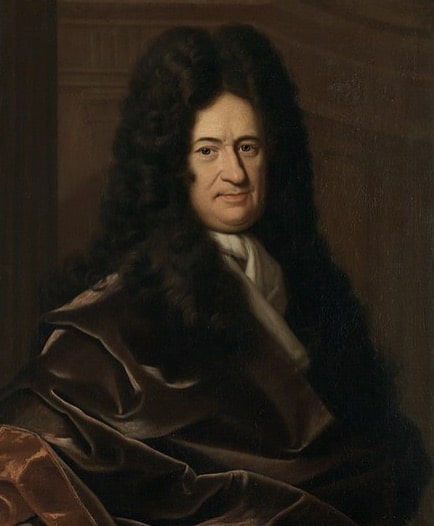
Gottfried Wilhelm Leibniz (1646-1716) was born on July 1, 1646, in Leipzig, Germany. He grew up in a scholarly family and showed exceptional intellectual abilities from an early age. Leibniz’s father died when he was six years old, leaving him under the care of his mother, who encouraged his education. When he was 8 years old, he began the study of Latin from books in his father’s library, and by age 12 was writing Latin poetry. He then proceeded to teach himself Ancient Greek.
At the age of 15, Leibniz enrolled at the University of Leipzig where he studied philosophy, law, and theology. He quickly developed an interest in mathematics and physics and began to explore various scientific and philosophical works. Leibniz’s broad range of interests led him to delve into various disciplines, including history, linguistics, and logic. Gottfried graduated with a bachelor’s degree in 1663, at the age of 17. By the time he was 20, the study of law, that he had undertaken at age 15, qualified him for a Doctor of Law, but he was denied the degree by the Leipzig faculty on account of his young age.
One of Leibniz’s most significant accomplishments was the development of calculus. He independently formulated the principles of what he called “differential calculus” and “integral calculus.”. Although Isaac Newton was the first to discover calculus, Leibniz was the first to publish, leading to a long-standing controversy over who truly deserved credit for its invention. Historians of mathematics generally acknowledge Newton and Leibniz as co-inventors of calculus. In the centuries that followed, Leibniz’s notation and methods became the more common formulation of this subject.
In addition to his mathematical and philosophical pursuits, Leibniz contributed to the development of the binary number system, in which each whole number is uniquely expressed as a sequence of 0’s and 1’s. Combining his work on mathematical logic with his binary number system, he laid the foundation for the development of modern computers.
Leibniz held positions in the courts of several German rulers and engaged in diplomatic missions to promote peace and intellectual collaboration among nations. He also served as advisor to various political figures throughout his life, including the famous Brunswick family. Gottfried corresponded with numerous scholars and philosophers of his time, exchanging ideas and expanding his intellectual network, and after organizing the Berlin Academy of Sciences, became its first president.
Despite his many achievements, Leibniz faced numerous challenges and setbacks throughout his life. In addition to the priority dispute over the invention of calculus, he often found himself embroiled many other intellectual disputes and controversies. His efforts to establish an academy of sciences in Germany were met with resistance, as were his plans for an academy of science in Dresden.
Gottfried Wilhelm Leibniz passed away on November 14, 1716, at age 70, in Hanover, Germany, leaving behind a rich legacy of ideas and contributions to various fields of knowledge. Historians report that he died a “broken man,” having suffered the jealousies, betrayals, and opposition that visits those of extremely high intelligence. His work continues to be studied and admired by scholars and remains influential in mathematics, philosophy, and computer science. Leibniz’s insatiable curiosity and multidisciplinary approach to knowledge continue to inspire generations of thinkers and innovators, and he will be remembered as one of the giant intellects in the history of our species.
